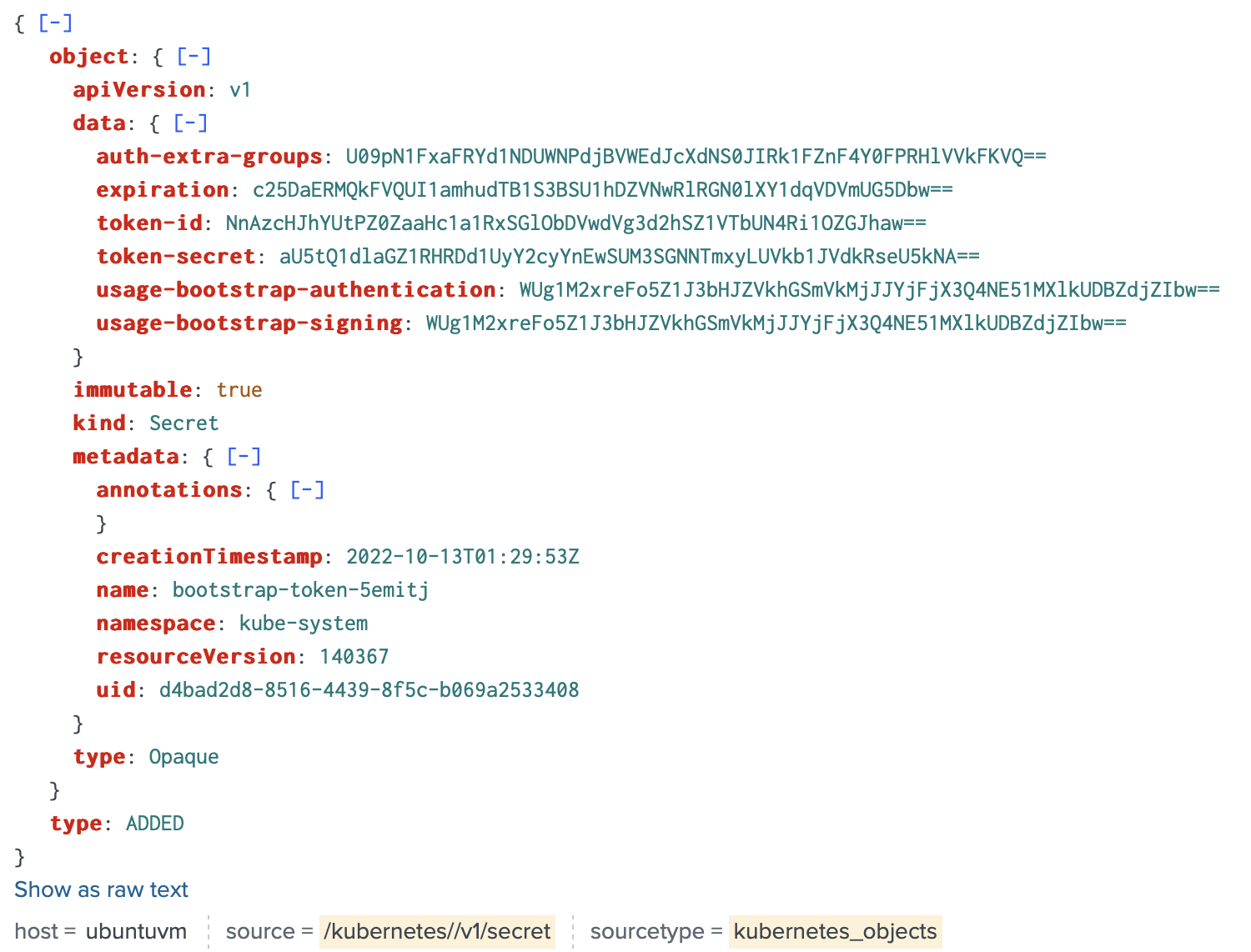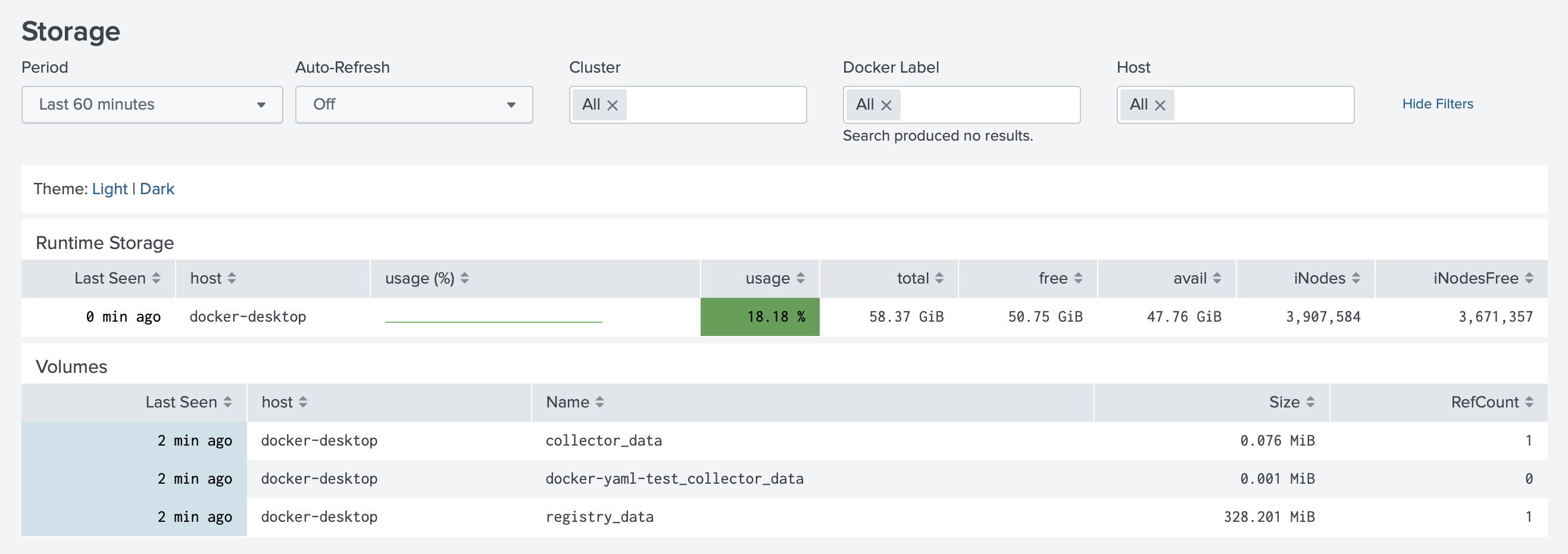Monitoring Docker, OpenShift and Kubernetes - Version 5.19
October 17, 2022- (Kubernetes and OpenShift) Modifying objects streamed with Kubernetes Watch Input
- (OpenShift, Kubernetes) Allow to override collectord.io annotations from Configurations
- (Docker) Streaming system/df to get information about Docker Volumes
- (OpenShift, Kubernetes, Docker) Monitoring if node needs to be rebooted
- (Kubernetes, OpenShift) Improved work with Kubernetes API server, when watching Pods
- Splunk output additional configurations
- Links
The main focus of this release was to implement feature requests that we received from our users and various configuration updates for latest versions of Kubernetes, OpenShift and Docker.
(Kubernetes and OpenShift) Modifying objects streamed with Kubernetes Watch Input
Collectord can Watch and Stream any type of objects from the Kubernetes API. Both, OpenShift and Kubernetes deployments have by default enabled Kubernetes Watch inputs for Pods and ResourceQuotas. And users always had ability to add their own inputs for the type of objects they want. ConfigMaps, Deployments, and any other type of objects. But there was an issue, if you wanted to also stream Secrets to Splunk, you did not want to expose secret values. With this release we have added ability to remove some fields from the objects, or hash their values.
If in the ClusterRole collectorforkubernetes or collectorforopenshift you add secrets under resources to give ability
Collectord to have access to those objects, you can add another input in 004-addon.conf
[input.kubernetes_watch::secrets] disabled = false refresh = 10m apiVersion = v1 kind = Secret namespace = type = kubernetes_objects index = output = excludeManagedFields = true # hash all fields before sending them to Splunk modifyValues.object.data.* = hash:sha256 # remove annotations like last-applied-configuration not to expose values by accident modifyValues.object.metadata.annotations.kubectl* = remove
One of the secrets that I had on my cluster is
apiVersion: v1 kind: Secret metadata: name: bootstrap-token-5emitj namespace: kube-system data: auth-extra-groups: c3lzdGVtOmJvb3RzdHJhcHBlcnM6a3ViZWFkbTpkZWZhdWx0LW5vZGUtdG9rZW4= expiration: MjAyMC0wOS0xM1QwNDozOToxMFo= token-id: NWVtaXRq token-secret: a3E0Z2lodnN6emduMXAwcg== usage-bootstrap-authentication: dHJ1ZQ== usage-bootstrap-signing: dHJ1ZQ== immutable: true
Collectord forwarded this secret to Splunk and hashed all values under data

The syntax of modifyValues. is simple, everything that goes after is a path with a simple glob pattern where * can
be in the beginning of the path property or the end. The value can be a function remove or hash:{hash_function},
the list of hash functions is the same that can be applied with annotations.
You can read more about how to Stream and Query API Objects in
- Monitoring OpenShift: Streaming Kubernetes Objects from the API Server
- Monitoring Kubernetes: Streaming Kubernetes Objects from the API Server
(OpenShift, Kubernetes) Allow to override collectord.io annotations from Configurations
With the annotations collectord.io you can change how Collectord forwards events to Splunk HTTP Event Collector.
In version 5.12 we also introduced Cluster Level Annotations where you can define annotations for multiple Pods in
your cluster by defining matching specs (for example apply those annotations when the image name is matching regular
expression pattern).
But if you already have an annotation, for example, collectord.io/index=foo defined on Namespace, Deployment or Pod,
and if you are trying to apply this annotation from Cluster Level Configuration as collectord.io/index=bar, the one
from the objects will take priority.
With this version we introduced a force modifier, that will force to override those annotations, even if you have
them defined on the objects.
1 2 3 4 5 6 7 8 9 | apiVersion: "collectord.io/v1" kind: Configuration metadata: name: apply-to-all-nginx annotations: collectord.io/index=bar spec: kubernetes_container_image: "^nginx(:.*)?$" force: true |
NOTE: if you have an annotation defined in the namespace as
collectord.io/logs-index=foo, it will still take priority overindex=bar, aslogs-index=foois type specific.
(Docker) Streaming system/df to get information about Docker Volumes
We have improved the Docker API input as well. There are some API responses, that don't return arrays, but objects
with properties containing arrays. One of them is system/df, that can return information about Volumes.
By default, collectorfordocker now has input.docker_api::system enabled, that forwards information about Volumes.
Monitoring Docker application now has list of volumes under Review->Storage

(OpenShift, Kubernetes, Docker) Monitoring if node needs to be rebooted
In version 5.12 we have added first diagnostics check for the node-entropy,
in this release we have added a new one [diagnostics::node-reboot-required], that will monitor for the presense of
files under /var/run/reboot-required* and write in the logs ALARM-ON "node-reboot-required".
Applications now has an alert enabled, that will notify you if some ALARMS are ON (entropy or reboot-required).
(Kubernetes, OpenShift) Improved work with Kubernetes API server, when watching Pods
Collectord was built from day one as container-native logging solution. We provide a different approach for collecting logs, where we watch first of all new created containers, and only after that monitor container logs on the disk.
When Collectord learns about new Pod, it traverses the ownership tree to collect as much metadata as possible. That approach
worked great for a while, but with the growing number of Operators, the ownership tree can be really large. That
could cause 403 requests from collectord to API Server, as there are could be some resources that aren't allowed by
ClusterRole.
With this release Collectord has an API Gate, that will not allow it to traverse the ownership tree with the objects, it does not
have access to. Under [general.kubernetes] you just need to tell Collectord which clusterrole is used.
For OpenShift that would be clusterrole = collectorforopenshift, for Kubernetes clusterrole = collectorforkubernetes.
And if this ClusterRole allows Collectord to read clusterroles, it will read it, and use it to block any requests
to API Server, not causing any 403 requests on API Server.
Splunk output additional configurations
maximumMessageLength
You can configure maximumMessageLength to truncate messages before sending them to Splunk.
For example if you define maximumMessageLength = 256K, Collectord truncates message for all events that have length
exceeding this size, and adds a field to the event collectord_errors=truncated, allowing you to review truncated events.
requireExplicitIndex
This was a popular feature requests. Adds additional option to implement opt-out by default behavior for forwarding
logs and metrics. If requireExplicitIndex is set to true Collectord does not forward events (logs and metrics) that
do not have index explicitly configured with annotations or in the ConfigMap. By default, Collectord forwards those
events with empty index, and in case of HTTP Event Collector it uses default index set for the Token.
Links
You can find more information about other minor updates by following links below.
Release notes
- Monitoring OpenShift - Release notes
- Monitoring Kubernetes - Release notes
- Monitoring Docker - Release notes



